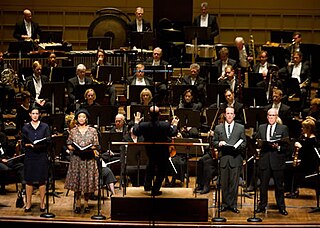
A musical ensemble, also known as a music group or musical group, is a group of people who perform instrumental and/or vocal music, with the ensemble typically known by a distinct name. Some music ensembles consist solely of instrumentalists, such as the jazz quartet or the orchestra. Other music ensembles consist solely of singers, such as choirs and doo wop groups. In both popular music and classical music, there are ensembles in which both instrumentalists and singers perform, such as the rock band or the Baroque chamber group for basso continuo and one or more singers. In classical music, trios or quartets either blend the sounds of musical instrument families or group together instruments from the same instrument family, such as string ensembles or wind ensembles. Some ensembles blend the sounds of a variety of instrument families, such as the orchestra, which uses a string section, brass instruments, woodwinds and percussion instruments, or the concert band, which uses brass, woodwinds and percussion.

Chamber music is a form of classical music that is composed for a small group of instruments—traditionally a group that could fit in a palace chamber or a large room. Most broadly, it includes any art music that is performed by a small number of performers, with one performer to a part. However, by convention, it usually does not include solo instrument performances.
A quintet is a group containing five members. It is commonly associated with musical groups, such as a string quintet, or a group of five singers, but can be applied to any situation where five similar or related objects are considered a single unit.
John Harris Harbison is an American composer, known for his symphonies, operas, and large choral works.

Steven Edward Stucky was a Pulitzer Prize-winning American composer.
Chen Yi is a Chinese-American composer of contemporary classical music and violinist. She was the first Chinese woman to receive a Master of Arts (M.A.) in music composition from the Central Conservatory of Music in Beijing. Chen was a finalist for the 2006 Pulitzer Prize for Music for her composition Si Ji, and has received awards from the Koussevistky Music Foundation and American Academy of Arts and Letters, as well as fellowships from the Guggenheim Foundation and the National Endowment for the Arts. In 2010, she was awarded an Honorary Doctorate from The New School and in 2012, she was awarded the Brock Commission from the American Choral Directors Association. She was elected to the American Academy of Arts and Letters in 2019.
Ensemble 360 is a British chamber music ensemble founded in 2005 by Music in the Round following the retirement of the Lindsay String Quartet. It comprises five string players, five wind players, and a pianist, and as often as possible presents concerts 'in the round', a performance style which is characteristic of its home venue, the Crucible Studio in Sheffield, England.
Margaret Brouwer is an American composer and composition teacher. She founded the Blue Streak Ensemble chamber music group.

Lior Navok is an Israeli classical composer, conductor and pianist. He was born in Tel Aviv. His music has been performed internationally by orchestras and ensembles including the Oper Frankfurt, Nuernberg Opera, Israel Philharmonic Orchestra, Boston Modern Orchestra Project, and the Tanglewood Festival Orchestra. Amongst the awards he has received are those from the Israel Cultural Excellence Foundation and the Massachusetts Cultural Council. He has also received awards from the Fromm Music Foundation, Lili Boulanger Memorial Fund Award, and Israel Prime Minister Award. In 2004, he was one of seven composers awarded commissions for new musical works by the Serge Koussevitzky Foundation in the Library of Congress and the Koussevitzky Music Foundation.
The Melos Ensemble is a group of musicians who started in 1950 in London to play chamber music in mixed instrumentation of string instruments, wind instruments and others. Benjamin Britten composed the chamber music for his War Requiem for the Melos Ensemble and conducted the group in the first performance in Coventry.
The New York Philomusica Chamber Ensemble is a musical ensemble founded in 1971 by A. Robert Johnson in New York City. The group presents an annual concert series of chamber music in New York City, Rockland County, and occasionally performs on tour. The ensemble owns the New York Philomusica Records label, which they use to sell albums of their music.
In music, a decet—sometimes dectet, decimette, or even tentet—is a composition that requires ten musicians for a performance, or a musical group that consists of ten people. The corresponding German word is Dezett, the French is dixtuor. Unlike some other musical ensembles such as the string quartet, there is no established or standard set of instruments in a decet.
Marti Epstein is an American composer. She is Professor of Composition at Berklee College of Music and the Boston Conservatory at Berklee.
Cecil Aronowitz was a British viola player, a founding member of the Melos Ensemble, a leading chamber musician, and an influential teacher at the Royal College of Music and the Royal Northern College of Music.
Lunatics at Large is a New Music chamber ensemble based in New York City. It was formed in 2007 to explore the repertoire for mixed chamber combinations beginning with Arnold Schoenberg's Pierrot lunaire, op. 21. Lunatics at Large is a Pierrot ensemble augmented with soprano and viola.
Victoria Ellen Bond is an American conductor and composer in New York City.
Valerie Coleman is an American composer and flutist as well as the creator of the wind quintet Imani Winds. Coleman is a distinguished artist of the century who was named Performance Today's 2020 Classical Woman of the year and was listed as “one of the Top 35 Women Composers” in the Washington Post. In 2019, Coleman's orchestral work, Umoja, Anthem for Unity, was commissioned and premiered by the Philadelphia Orchestra. Coleman's Umoja is the first classical work by a living African American woman that the Philadelphia Orchestra has performed.

Luz Leskowitz is an Austrian violinist, founder of the Salzburg Soloists music ensemble. He is an owner of the ex-Prihoda Stradivarius violin made in 1707.
Musicians of the Old Post Road (MOPR) is a chamber music ensemble based in the Boston area that specializes in period instrument performance. The ensemble often performs "rediscovered" works from the Baroque, Classical, and Romantic periods. The ensemble, founded by Artistic Directors Suzanne Stumpf and Daniel Ryan, performs in historical buildings along the Boston Post Road, which was a trade and travel route between Boston and New York City from the late 17th through mid-19th centuries. MOPR's repertoire spans these dates. The group has produced seven CDs, toured throughout Europe and North America, and received numerous awards, including the Noah Greenberg Award from the American Musicological Society in 1998.
Capricorn was a mixed chamber ensemble based in London and active in the 1970s, 1980s and 1990s. Founded by the cellist Timothy Mason, clarinettist Anthony Lamb and pianist Julian Dawson-Lyell, the original lineup was augmented by the violinist Monica Huggett to perform Messiaenʼs Quartet for the End of Time which featured in their London debut concert at Wigmore Hall in January 1974.





